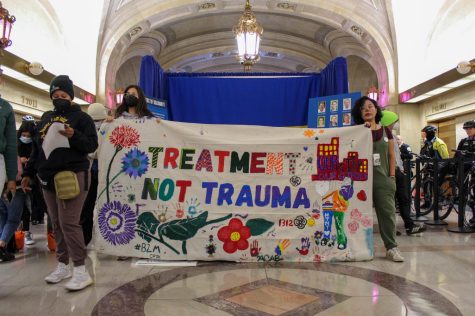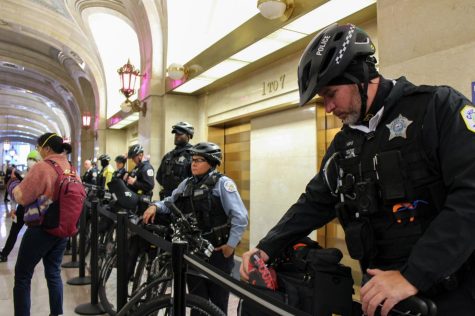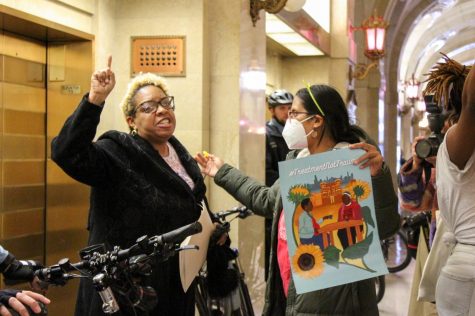#TreatmentNotTrauma demands mental health services over proposed CPD budget increases
October 24, 2022

Dressed in Halloween costumes and carrying jack-o-lanterns full of candy, community organizers and students marched into the lobby of City Hall Friday to protest against the proposed increased police budget.
The Chicago Police Department is looking at a $64 million increase in their 2023 budget, according to the Better Government Association, a nonpartisan watchdog publication of Illinois government. More than $28 million of this increase is allocated for grants and supplemental funds.
The crowd of Chicago youth, surrounded by police officers, held protest signs — one being a life-size, hand-painted Lori Lightfoot cutout — marched and chanted, “We want treatment, not trauma,” and “We’re here to stay, open our clinics.”
#TreatmentNotTrauma is a campaign created by Collaborative for Community Wellness with the goal of increasing support and city funding for mental health services, including a 24-hour hotline and the reopening of South and West Side mental health clinics closed by former mayors Rahm Emanuel and Richard M. Daley.

China Smith, a field organizer with Defund CPD in the 20th Ward, said the main point of the #TreatmentNotTrauma campaign is the importance of creating a non-police crisis response line for mental health emergencies.
“The issue with police is that not only are they over-funded, but they don’t have the proper training, like de-escalation training to handle a mental health crisis,” Smith said. “They aren’t trauma-informed.”
According to the BGA, the Chicago Police Department’s proposed increase will amount to a total of $1.9 billion in funds for the 2023 year. Meanwhile, the Chicago Department of Public Health is looking at a possible $78 million decrease in its 2023 budget, although the decrease is largely due to the COVID-19 relief grant being eliminated. The CDPH total proposed budget for 2023 is more than $963 million, just under half of CPD’s.
Organizer Asha Ransby-Sporn with Defund CPD held a megaphone to the crowd asking for CPD funds to be reallocated to reopening the shuttered mental health clinics.
“Funding for mental health services for last year, for all of 2022, was the equivalent of what the city spends on CPD in less than two weeks,” Ransby-Sporn said. “#TreatmentNotTrauma, as envisioned by the Collaborative for Community Wellness, presents an alternative vision, a way our city can take a step towards a different approach and a different set of priorities.”

Cheryl Miller, public health organizer of STOP Chicago — which stands for “Southside Together Organizing for Power” — works alongside #TreatmentNotTrauma organizers to boost the campaign’s voice.
“We want social workers [at mental health crises],” Miller said. “It makes no sense to have a police officer there for a nonviolent offense.”
The 988 mental health hotline was implemented nationwide by the Federal Communications Commission in July 2022, but mental health advocates are urging the city to support a system where police are not involved at all in mental health responses.
Police at the City Hall protest declined to comment.







